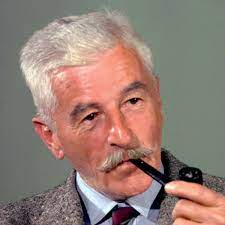The wanton, callous destruction, death, and suffering sear the soul.

Having denied that Russia’s Ukraine aggression is a “war,” Putin now denies that it’s going horribly, with atrocious Russian casualties. Causing him to throw in another 300,000 men. Hardly crack troops, they’ll be given derisory training, just cannon fodder. They won’t help much to win this misbegotten war.
Unsurprisingly, these new victims aren’t gladly marching into the meat grinder; they’re flooding all paths to leave Russia. Putin promises harsh punishment for that. And protesters are threatened, too, with being sent to the front. All part of his escalating crackdown and destruction of civil society. While casting this war as somehow an assertion of Russia’s greatness. A wonderful country.

Hitler and the Nazis were bad too. And Stalin and Mao and their henchmen. But give them this — they were honest inasmuch as they really believed their shit. That can’t possibly be true of Putin and company. Like Foreign Minister Lavrov — too intelligent to actually believe what comes out of his mouth. I’m not suggesting, of course, that nobody ever really lied before. Yet this actually seems different, carrying the brazenness to a new plateau. That surely applies also to Trump and his apologists.
Although the Western sanctions against Russia were surprisingly strong, Russia is doing well weathering them. The Rouble first crashed, then recovered. Oil and especially gas prices spiked, and those are major Russian exports. While sales to Europe are way down, Russia is able to sell elsewhere, notably to India and China, albeit with discounts. Despite that, Russia is still profiting hugely. And even while Europe too has done a lot to adapt to these new circumstances, the reduction in gas supplies, and the resulting stratospheric prices, presage a very tough winter there. Which Putin may be counting upon to weaken Europe’s resolve.

Meantime, even as Ukrainian forces roll back Russia’s hold on the country’s east, Putin has conjured “referendums” for inhabitants to vote to join Russia. Another desperation move in his war against reality. The voting, conducted at gunpoint, so obviously a cynical sham. Why even bother with actual ballots? Just announce the vote was held, with overwhelming assent. Would be no different in substance.
But note this about the phony “referendums.” They enable Putin to now claim it’s not a “special military operation” against Ukraine but, rather, a defense of (what is now notionally) Russia itself. The war did originate with the ridiculous lie that Ukraine, and NATO, were somehow threatening Russia’s security. Now Putin can seemingly validate the lie by asserting that Russia’s security is directly threatened — by what are actually Ukraine’s efforts to recover its own stolen lands.
Note too that Russia’s longstanding nuclear weapons doctrine says they can be used only against an existential threat to the nation. But with the ruse that eastern Ukraine is now Russia’s own territory, Putin could use attacks upon that territory as a seeming pretext for nuclear strikes. Mooted as his last ditch move to avoid defeat.
He does keep threatening that. Is it bluffing? In a recent zoom briefing, leading Ukraine analyst Alexander Vindman suggested that even if Putin actually wanted to use nukes in Ukraine, his ability to actually execute on that would be questionable. There’s a lot of logistics involved, and battlefield conditions with Ukraine doing so much to disrupt Russia’s operations make it doutbtful they could bring off a nuclear strike.

Ukraine’s giving Russia a bloody nose is gratifying. Showing us idealists there is, after all, some justice even in today’s fraught world. But there’s still a very big question about how this ends. Even short of the nuclear option, it’s hard to see Putin swallowing defeat, coming out of it with nothing gained. It would be pretty to imagine Putin ousted, though that scenario too is very problematical. I wouldn’t want to be the guy in the Kremlin who tries to plot a coup. And furthermore we shouldn’t imagine Putin being replaced by a Nelson Mandela.










































